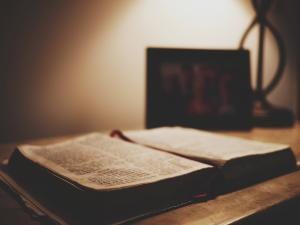I’ve said before—probably in my book which you should be able to buy in October just in time for Christmas—that it may be fine to ask, “What would Jesus do?” as your lodestar, but you might want to think for a few minutes before wondering, “What would Jesus pray?” and then going and doing thou likewise. Jesus does a lot of things in the Gospels that most of us neither can do nor should do—like standing before all of his enemies and claiming to be God, like dying for the sins of the world, like denouncing those unrepentant cities as being worse than Sodom and Gomorrah, like here, thanking God that not everyone is going to get it. Moreover, he prays this prayer in public, so that the people he is praying about will be able to hear him. A person who loves Jesus can go a great distance in following after and doing what he did, but after a while, there is a limit.
That is only one of the problems with these brief, biting verses, wedged into Matthew’s gospel. The idea that God, who as we all know is love and love is love, would purposefully exclude some people from his kingdom, and would be thankful to have done so, offends today’s Law of Inclusion to such a degree that it is intolerable even for some Christians. “Yes, Father,” for such is your gracious will,” says Jesus, happy that the glorious riches of his gospel are revealed to “little children”—that diminutive and not particularly complimentary term he often employed for his disciples—and not to the “wise and understanding.”
Wisdom comes in all shapes and sizes, depending on the context and the moment. Yesterday, it being the Fourth, there were thousands of swirling “wise” sayings on various social media platforms. Contradictory epithets were tossed back and forth across the cyber waves—America is Great, America is terrible, freedom means never having to wear a mask ever, freedom means not having to get covid, if I can’t sing it won’t even be church, every governor is Satan, Christians who even want to sing are Satan, or maybe Hitler, the Founders were all racist, the Founders were all better even than Jesus. For a while I tried to compose a tweet in my mind that would contribute to this great national conversation, but then I wandered away to eat more pie, because, after all, I am an American, and Americans must eat pie. It’s the patriotic thing to do.
This wisdom of God, no matter what any of us pretend about it, is not the wisdom of men, nor even women. If you wanted to think about What Jesus Would Do and What Jesus Would Pray, you can’t take your already formed cultural assumptions about what is good and right and then go back to the text and try to make sense of it. Which is at least one of the other problems arising in this brief terrible moment. John the Baptist is in prison for calling Herod, of all people, to repent for committing adultery—always a complicated and tetchy thing to do in any age, the moral vagaries of powerful leaders and their sexual proclivities all wrapped up in the politics of the moment—and he hears what Jesus is doing, and it doesn’t quite match what he expected, and so he sends his own disciples to find out if maybe he had the wrong end of the stick, maybe Jesus isn’t who he thought. But no, Jesus sends back, it’s going exactly to plan, I am who you thought I was.
Then Jesus denounces those wicked cities. Then he explains that he and the Father are so united in will and purpose that no shadow can fall between them. And then he brings up this other problem that I think most Christians would be completely reasonable to question. “Come to me,” he says, “all who labor and are heavy laden, and I will give you rest. Take my yoke upon you and learn from me, for I am gentle and lowly in heart, and you will find rest for your souls. For my yoke is easy, and my burden is light.” Tell that to John in prison, who will shortly lose his head as a party trick, any stander-by might have muttered. Or Mary and Martha, when they explained in grief-soaked tones to Jesus, who they knew had the power to raise the dead, that if he had been there, their brother would not have died. Or his own Mother when Jesus himself was nailed to his own cross. Or anyone really, at any point in human history, who looks at the wisdom of God and the real circumstances of life and suffers a whole-body shudder.
Indeed, looking at it from this angle, signing on to follow Jesus, to be one of his “little children,” to have hidden riches of his grace revealed so brightly, even in the presence of an unbelieving, unrepentant, violent and adulterous world, the very last words one finds oneself groping for are “light” and “rest.” It’s the warning to count the cost that feels most useful when casting abroad the good news of God in Christ. Think carefully, sensible people say, this won’t be easy. You’re signing up to lose everything. You’re humbling yourself to the point almost of humiliation. You’re letting go of everything you have ever thought you needed to be ok and having in its place only one thing, only Jesus. It is no light choice. You may lose sleep—scratch that, you will lose sleep.
I think a lot of us run to the “little children” image to try to make sense of this. It’s all about trust, we say. Babies and children easily trust those who take care of them. They aren’t worried or anxious. They make cookies with their mother and their mother is happy to have their “help.” It is a warm and glowing picture until you discover that your “helpful” participation in this warm, trusting, delightful picture may—nay will—include your death in one way or another. Indeed, I think many Christians are rightly more anxious than other people. They see the wickedness of Chorazin, of Bethsaida, of Capernaum, of Herod and they tremble. They pray desperately, asking God if he really knows what he is doing.
And in response, Jesus says, essentially, “Yes.” I know what I’m doing. I’m picking up the burden of your sin that will weigh you down and drag you into hell, and I’m carrying it for you. In exchange, here is my own goodness—a burden so light, a yoke so kindly that you cannot feel its weight. Indeed, the goodness and glory of Jesus is a rest that lasts into eternity. Who is even carrying you along through your anxieties and griefs? Who is even burdening you to pray for the lost and incoherent? Who is even getting you out of bed to put on your dreaded mask and sit muffled in church, mourning the music that normally carries you through the week?
He is. And honestly, what is the alternative? Going away after some other paltry, pitiful wisdom? Not for all the glory in the world.












